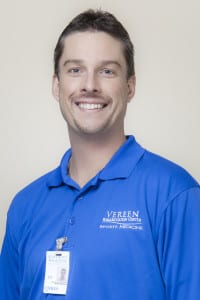Chris Stroh, OTR/L, CHT is the Occupational Therapist/Certified Hand Therapist at the Vereen Rehabilitation Center. Chris graduated from South Dakota State University in 1992 with B.S. degree in Biology/Chemistry and he then attended Florida A & M University where he received his B.S. degree in Occupational Therapy.
Chris’ work experience includes: 1) Tallahassee Memorial Hospital, for 2 years, in a primarily acute care setting providing a services for orthopedic, neurologic, and general medical conditions. 2) HealthSouth Rehabilitation Hospital, for 7 years, in an inpatient and outpatient setting providing care for orthopedic, neurologic, and general conditions. He was also involved with the Industrial Rehabilitation program where he performed quality assurance checks for regional Functional Capacity/Work Capacity Assessments. Chris is also a Certified Hand Therapist, which is a particularly challenging certification that is highly respected within the medical community.
Chris has been employed at Colquitt Regional Medical Center since 2004 and specializes in treatment of upper extremity injuries with a particular interest in orthopedic injuries of the shoulder and hand.
Chris Stroh is one of Vereen’s veteran occupational therapists. Also certified as a hand therapist, Stroh has been an influential and positive member of the team since 2004.
Originally from Alaska, Stroh moved to South Dakota to receive his first degree in biochemistry in 1992. He then moved to Tallahassee, Florida, where he attended Florida A&M University and graduated with an occupational therapy degree in 1995. In 2011, he earned his certification as a hand therapist.
Stroh came upon Colquitt Regional Medical Center when it was recommend to him after he and his wife moved to Thomasville for her work.
“My wife went back to nursing school and ended up getting a job at Thomasville OB/GYN, so we had to move to Thomasville, Georgia, and in that moving process someone told me about a job opening in Moultrie, Georgia,” Stroh said. “I checked it out, came up here and interviewed for the position, and just kind of liked what I saw up here.”
Stroh has always had an interest in the things that make up the daily functions of an occupational therapist; fortunately, he found a job that could combine all of his interests.
“I’ve always had an interest in the sciences: anatomy, physiology, and things like that,” he said. “In high school I played all sorts of sports. I played basketball, football, and baseball. My dad actually suffered an injury playing volleyball, and I went to attend his therapy sessions. I started talking to the therapist and going to the sessions and observing more.”
On a day-to-day basis, Stroh works on a wide range of injures in a specific area of the body.
“My day-to-day outlook or caseload looks like a lot of upper extremity injuries,” Stroh said. “I do a lot of orthopedic therapy, wrist and shoulder therapy, and it can vary. We can get stroke patients in, but a majority of it is working with carpal tunnel injuries, wrist fractures, and elbow injuries. I do a lot of shoulders, rotator cuff injuries, and stuff like that.”
To stay motivated, Stroh reminds himself that his job is essential to changing and improving patients’ lives.
“If I can get one patient and they can make a fist or they can raise their hand above their head or they can put it behind their back, that’s the kind of thing we strive for,” he said. “That’s what we want to do, and just making those (improvements), even if they seem like little things, they add up to big things in a day-to-day function and how they impact a patient’s life.”
What Stroh likes best about his job is the knowledge and experience he uses to ensure a smooth and efficient recovery.
“I feel like I have the knowledge to guide them through, and that’s basically what we do as therapists,” he said. “We guide people through what they’re doing. You know, it’s not us that does the great job. We get them started, they do the great job, and they don’t realize it. We’re like a bottom part of a rocket booster in this; we get them up off the ground and get them going and just kind of take it from there.”
One of the toughest aspects, according to Stroh, is making sure patients develop a sense of trust with their doctors.
“In the recovery process, I try to put them at ease,” he said. “Most people coming in are fairly apprehensive. We kind of have to talk them off the ledge a little bit and just put them at ease. Building a relationship and establishing trust is huge in the rehab process. You have to build that trust and that clinical report set with your patients. If they trust you, they’re going to be more apt to listen to you and follow through with what you’re telling them. It will improve your outcome.”
Stroh believes that the Vereen Center is different from other rehabilitation centers due to the experience of its staff and the support of its administration.
“I think the thing that’s makes us special and unique here at the Vereen Center is the amount of experience that we have in our facility,” he said. “You know, little Moultrie, Georgia, we’re not Atlanta. We’re one of the bigger companies around, but we do have a lot of experience. We have several therapists that have many, many years, I’d say 20-plus years, of experience. So if one of us gets stuck on something, generally we can go to another person. And usually they’re pretty solid ideas because a lot of it is been there and done that. We kind of have like a family away from your family, so everyone gets along pretty well. The other big thing that we have going for us here is the backing from our administration. They make sure that we have the resources that we need and to utilize to improve every outcome.”
On his down time, Stroh likes to be outdoors and stay active. He qualified for the national duathlon team and competed in the long course duathlon championship in Switzerland in September 2017.
“I like to do running and a lot of cycling,” Stroh said. “When I’m not doing that, I’m just hanging around outside. I enjoy hunting and fishing.”
Stroh’s last piece of advice is to be aware of how you carry yourself, especially as you get older.
“Beware of your posture,” he said. “Your postural chain plays a huge role in how everything else functions. Once your posture starts to slump over and your shoulders roll over, it affects your upper extremity function. It affects your neck, and it can lead to other things, headaches and what not. Lower back problems develop, and leg problems, which develop into foot problems, and the changes just go on from there. So just having a nice full posture and being upright is one of biggest things you can do to help yourself.”


